人教版英语八年级上册 Unit 7 Will people have robots教材全解及单元测试卷
- 格式:docx
- 大小:41.09 KB
- 文档页数:12

人教版英语八年级上册Unit 7《Will people have robots》教学设计一. 教材分析人教版英语八年级上册Unit 7 “Will people have robots” 主要围绕未来科技的发展,特别是机器人的应用进行展开。
本节课主要通过一个关于未来世界的对话,让学生掌握一般将来时的用法,以及如何谈论未来的一些预测。
教材还包括一些阅读材料和任务,旨在提高学生的阅读理解和口语表达能力。
二. 学情分析八年级的学生已经掌握了基本的英语语法和词汇,对一般现在时和一般过去时已经有了初步的了解。
但是,对于一般将来时的用法和如何准确地谈论未来的预测还需要进一步的讲解和练习。
此外,学生在阅读理解和口语表达方面还需要加强。
三. 教学目标1.学生能够理解和运用一般将来时。
2.学生能够通过阅读材料和对话,了解未来科技的发展趋势。
3.学生能够提高自己的阅读理解和口语表达能力。
四. 教学重难点1.一般将来时的用法。
2.如何准确地谈论未来的预测。
3.阅读理解和口语表达能力的提高。
五. 教学方法1.任务驱动法:通过设定一些与学生生活息息相关的情景,让学生在完成任务的过程中学习和运用语言。
2.交际法:通过模拟真实的交流场景,让学生在实际的语言环境中学习和运用语言。
3.合作学习法:通过小组讨论和合作,让学生相互学习,共同提高。
六. 教学准备1.教材和教学参考书。
2.多媒体教学设备。
3.与课程内容相关的网络资源。
七. 教学过程1.导入(5分钟)通过向学生展示一些机器人的图片,引起学生的兴趣,然后提问:“你们认为未来的人们会拥有机器人吗?”,让学生发表自己的看法。
2.呈现(10分钟)老师通过讲解和示范,向学生介绍一般将来时的用法,并举例说明如何准确地谈论未来的预测。
3.操练(10分钟)学生分组进行角色扮演,模拟真实的交流场景,运用一般将来时进行对话。
老师对学生的表现进行指导和评价。
4.巩固(10分钟)学生阅读教材中的阅读材料,理解并回答相关问题。


Unit 7 Will people have robots?Teaching goals:1.Knowledge and ability aims : 学习一般将来时态的相关知识,学会对未来进行预测。
对five years ago, today, in five years 简洁回顾与展望的方式,贴近实际符合学生心理,激发学习兴趣。
通过时间对比复习一般过去时态、一般现在时态,巩固一般将来时。
2.Course and method aims: Classifying and summerizing.3.Emotion attitude values aims: make the students love our great country.Important and difficult points:1. will构成一般将来时态的句式。
2. more, fewer, less 的用法。
3. How to make predictions.Teaching tool multimidaTeaching procedures:Step 1 Leading in1. Greetings.2. Say yourselves: five years ago , today and in five years.3. Check the homework.Step 2 Pre-task1. Look at the form and read the headings to the class .Make sure the Ss know what they mean.2. Read the list of seven words .Explain the new words.3. Write each word in the correct column .Check the answers.1. Read the words already written on the chart.2. Groupwork: Think about what we learned before. Write some words in the chartabove .Divide the class into groups of four ,let them have a competition.Step 3 While-task1. Look at the pictures carefully .Can you guess what we’ll listen ?Talk about them .2. Read the instructions .We’ll listen to 3 conversations .Number the pictures 1-3 .3. Play the tape twice .Check the answers.This activity is easy, I think .For we know the conversations are talking about Alexis 10 years ago, today and in 10 years.1. Read the instructions.2. Pay attention to the sentences and the verbs in the box.3. Play the tape and correct the answers.Step 4 Post-task1. Read the instructions .2. Pairwork. One is Alexis, one is Joe .3. Point out the example in the sample dialogue .Read it to the Ss .4. Talk about Joe’s life now , ten years ago and in ten years .5. Ask some pairs of Ss to say their dialogues .Homework:1. Go over the words .2.写一篇50个单词左右的小短文,预测与展望未来我们的学习和生活。
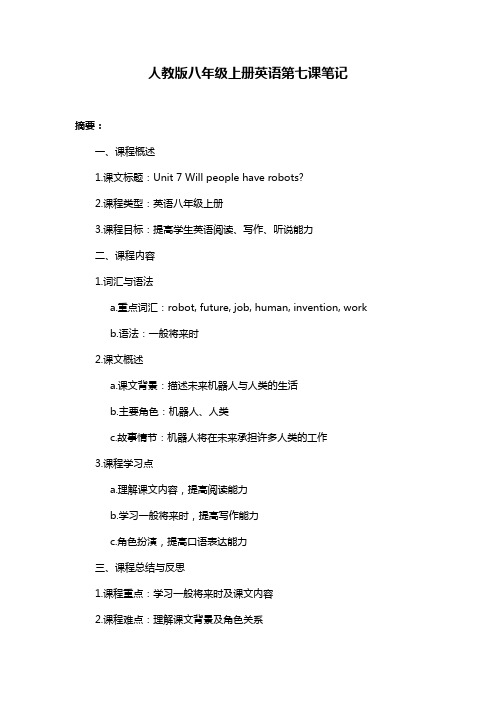
人教版八年级上册英语第七课笔记摘要:一、课程概述1.课文标题:Unit 7 Will people have robots?2.课程类型:英语八年级上册3.课程目标:提高学生英语阅读、写作、听说能力二、课程内容1.词汇与语法a.重点词汇:robot, future, job, human, invention, workb.语法:一般将来时2.课文概述a.课文背景:描述未来机器人与人类的生活b.主要角色:机器人、人类c.故事情节:机器人将在未来承担许多人类的工作3.课程学习点a.理解课文内容,提高阅读能力b.学习一般将来时,提高写作能力c.角色扮演,提高口语表达能力三、课程总结与反思1.课程重点:学习一般将来时及课文内容2.课程难点:理解课文背景及角色关系3.学习建议:多练习口语表达,结合实际生活场景运用所学知识正文:在我国人教版八年级上册的英语课程中,第七课的主题为“Unit 7 Will people have robots?”。
本课程旨在通过阅读、写作、听说等多种方式,帮助学生提高英语能力。
在课程中,首先学习了与主题相关的词汇与语法。
重点词汇包括robot (机器人)、future(未来)、job(工作)、human(人类)、invention(发明)和work(工作)。
语法方面,学生学习了如何使用一般将来时来描述未来的情况。
接下来,通过阅读课文,学生们对课程内容有了更深入的了解。
课文描述了一个未来的场景,在这个场景中,机器人将在各个领域承担许多人类的工作。
人类与机器人的关系成为本课的核心内容。
在学习过程中,学生们通过角色扮演等活动,提高了口语表达能力。
通过理解课文内容,学生们在阅读能力方面也得到了锻炼。
此外,学习一般将来时有助于提高学生的写作能力。
总的来说,本课程为学生提供了一个锻炼英语能力的平台。
在学习过程中,学生不仅需要理解课文内容,还要掌握语法知识和实际运用技能。


八年级上Unit7 Will people have robots?on computer在电脑上on paper在纸上live to do 200 years old活动200岁free time空闲时间in danger处于危险之中on the earth在地球上play a part in sth.参与某事space station太空站look for寻找computer programmer电脑编程员in the future在未来hundreds of许多;成百上千the same…as…与……一样over and over again多次;反复地get bored感到厌烦的wake up醒来fall down倒塌will+动词原形将要做……fewer/more+可数名词复数更少/更多……less/more+不可数名词更少/更多……have to do sth.不得不做某事agree with sb.同意某人的意见such+名词(词组)如此……play a part in doing sth. 参与做某事There will be + 主语+其他将会有……There is/are +sb./sth.+doing sth.有……正在做某事ake sb. do sth. help sb. with sth.帮助某人做某事try to do sth. 尽力做某事It’s+ adj.+for sb. to do sth. 对某人来说,做某事……的。
( )1.The students in our school learn English computers .A. atB. in C .on D.to( )2.I hope there will be pollution in the future .A.moreB.manyC.fewerD.less( )3. People visit Mount Tai every day .A.Two hundredsB.Hundred ofC.Hundreds D,Hundreds of( )4.People will make robots the housework in the future .A.doB.to doC.doingD.to doing( )5.Everyone in our class world peace .A.loveB.lovingC.lovesD.to love( )6. A football match next month .A.There isB.There hasC.There will beD.There will have( )7.How long will dogs live ? A.be B.to be C.on D.for( )8.There are some girls in the room .A.dancingB.danceC.dancesD.danced( )9.The child isn’t old enough to himself . A.wear B.dress C.put on D.be in( )10.It’s important the piano well .A.of him to playB. For him to playC.of him playingD.for him playing11. 预测未来可能很难。
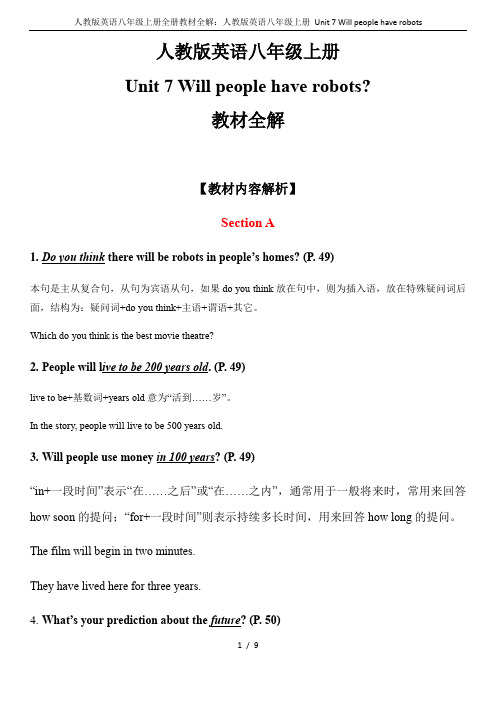
人教版英语八年级上册Unit 7 Will people have robots?教材全解【教材内容解析】Section A1.Do you think there will be robots in people’s homes? (P. 49)本句是主从复合句,从句为宾语从句,如果do you think放在句中,则为插入语,放在特殊疑问词后面,结构为:疑问词+do you think+主语+谓语+其它。
Which do you think is the best movie theatre?2.People will l ive to be 200 years old. (P. 49)live to be+基数词+years old意为“活到……岁”。
In the story, people will live to be 500 years old.3.Will people use money in 100 years? (P. 49)“in+一段时间”表示“在……之后”或“在……之内”,通常用于一般将来时,常用来回答how soon的提问;“for+一段时间”则表示持续多长时间,用来回答how long的提问。
The film will begin in two minutes.They have lived here for three years.4.What’s your prediction about the future?(P. 50)future作名词,表示“将来、未来”,in the future表示“在将来”。
Who knows what will happen in the future.5.I don’t think so.(P. 50)I don’t think so表示“我不这么认为”,肯定形式为I think so。
---Look at the cloud. It is going to rain.---I don’t think so. It will be sunny soon.【拓展】类似的结构还有:I hope so“我希望如此”,I hope not“我希望不是这样”,I’m afraid so“恐怕如此”,I’m afraid not“恐怕不是这样的”。
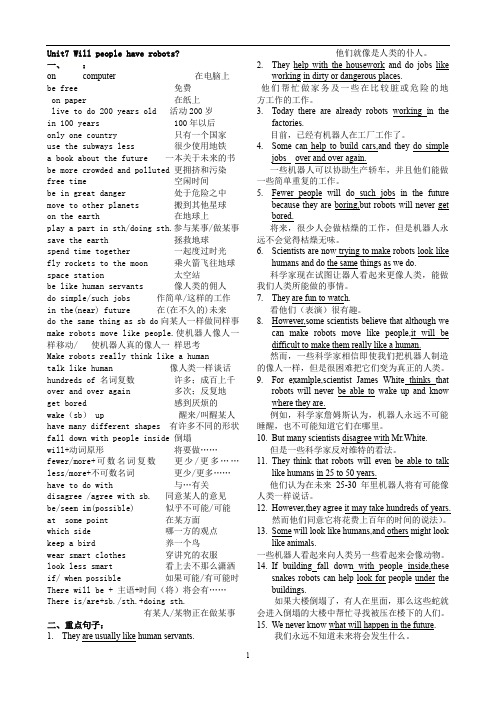
Unit7 Will people have robots?一、短语:on computer 在电脑上be free 免费on paper 在纸上live to do 200 years old 活动200岁in 100 years 100年以后only one country 只有一个国家use the subways less 很少使用地铁a book about the future 一本关于未来的书be more crowded and polluted 更拥挤和污染free time 空闲时间be in great danger 处于危险之中move to other planets 搬到其他星球on the earth 在地球上play a part in sth/doing sth.参与某事/做某事save the earth 拯救地球spend time together 一起度过时光fly rockets to the moon 乘火箭飞往地球space station 太空站be like human servants 像人类的佣人do simple/such jobs 作简单/这样的工作in the(near) future 在(在不久的)未来do the same thing as sb do向某人一样做同样事make robots move like people.使机器人像人一样移动/ 使机器人真的像人一样思考Make robots really think like a humantalk like human 像人类一样谈话hundreds of 名词复数许多;成百上千over and over again 多次;反复地get bored 感到厌烦的wake(sb) up 醒来/叫醒某人have many different shapes 有许多不同的形状fall down with people inside 倒塌will+动词原形将要做……fewer/more+可数名词复数更少/更多……less/more+不可数名词更少/更多……have to do with 与…有关disagree /agree with sb. 同意某人的意见be/seem im(possible) 似乎不可能/可能at some point 在某方面which side 哪一方的观点keep a bird 养一个鸟wear smart clothes 穿讲究的衣服look less smart 看上去不那么潇洒if/ when possible 如果可能/有可能时There will be + 主语+时间(将)将会有……There is/are+sb./sth.+doing sth.有某人/某物正在做某事二、重点句子:1.They are usually like human servants.他们就像是人类的仆人。

Unit 7 Will people have robots?词汇精讲1. duringduring是介词,意为“在……期间”。
例如:I went to see my uncle during my stay in Beijing. 我在北京逗留期间去北京看我叔叔了。
【拓展】during;in与for(1) during指“在……时间内,在……的期间”。
谓语动词常为表示持续性的动作或状态的动词,时间段前常有限定词(the; 物主代词等),表特指。
例如:He asked many questions during the three meetings.在这三次会议期间,他问了许多问题。
(2) in意为“在……时间内”,一般情况下可以和during互换,用in时往往强调某一动作发生在某一时间段中的某一时间点;during既可表示“在整个时间段期间”,也可表示“某时间段内的某个时间点”。
例如:Mike put his hand up three times during/in the class.在这节课内,Mike举了三次手。
(3) for意为“(时间)长达……”,强调时间由始至终,动作也贯穿这段时间的始终,可以和完成时连用。
强调持续时间的长短,回答how long的提问;而during则是指动作所发生的时间,回答when的提问。
例如:He stayed in Beijing for two years. 他在北京住了两年。
He swims every day during the summer. 夏天他每天去游泳。
2. in 100 yearsin 100 years意为“100年之后”,是由“介词in + 一段时间”构成,表示“在……之后”,多用于一般将来时。
对此短语提问时常用how soon。
例如:I will finish the task in two hours.我将在两个小时后完成这项任务。

姓名:班级Unit 7 Will people have robots?Section A本课重点1.will构成的一般将来时态的肯定句、否定句、一般疑问句及回答2.做预言,用will来讨论未来发生的事情3.用will来表达将来时,并能熟练运用there be 句型表达将来时4.明确区分可数名词和不可数名词;正确使用more,less,fewer 本课难点1.用will来表达将来时,并能熟练运用there be句型表达将来时2.明确区分可数名词和不可数名词;正确使用more,less,fewer 常考句型 1.Kids won't go to school. They will study at home on computers.2.People will live to be 200 years old.3.—Will people use money in 100 years?—No,they won't. Everything will be free.4.I think there will be more pollution.5.I don't think so.I think there will be fewer trees.6.It's a book about future.7.What will the future be like?8.Will we have to move to other planets?9.Everyone should play a part in saving the earth.一、单项选择1.Lingling and I __________ to Lao She Teahouse last night.A.go B.are going C.went D.will go2.There _______ a football match on TV this evening.A.will have B.will be C.has D.is going to have 3.—What's your aunt's plan for tomorrow?—She _________ to the theatre to see the Beijing Opera.A.go B.will go C.went D.goes4.When the rain ________, we’ll go home at once. But no one knows when the rain ________. A.stops; stops B.will stop; will stopC.stops; will stop D.will stop; stops5.If we do nothing to protect giant pandas, there ________ no more giant pandas in the future. A.will have B.will has C.will be D.will be going to have 6.—Will you go to the cinema with me tomorrow?—Sorry, I _____ skating with Tom.A.go B.goes C.went D.will go7.What will the future ________ like?A.is B.are C.am D.be8.— Will there be more schools in 20 years’ time?—________. I think students will study by Internet at home.A.No, there aren’t B.Yes, there are C.No, there won’t D.Yes, there will 9.The air ________ here makes me uncomfortable.A.discussion B.relationship C.pollution D.information 10.——How soon will he come back? ——___________ two days.A.Before B.After C.In D.For二、用所给词的适当形式填空。

八年级英语上册 Unit 7 Will people have robots?(第2课时)说课稿一. 教材分析《八年级英语上册》Unit 7 “Will people have robots?” 是人教版新目标英语教材的一个单元。
本单元主要围绕未来科技的发展,特别是机器人在日常生活中的应用进行讲解。
通过本单元的学习,学生可以掌握一般将来时的被动语态,提高自己的听说读写能力,并激发他们对未来科技的想象和思考。
二. 学情分析八年级的学生已经掌握了英语学习的基本语法和词汇,具备一定的听说读写能力。
他们对新科技充满好奇,善于接受新鲜事物,但同时也可能对一些抽象的概念和语言表达感到困惑。
因此,在教学过程中,我们需要关注学生的个体差异,因材施教,激发他们的学习兴趣和积极性。
三. 说教学目标根据《义务教育英语课程标准》和教材内容,本节课的教学目标如下:1.知识目标:学生能够掌握一般将来时的被动语态,理解与未来科技相关的词汇和表达。
2.能力目标:学生能够在真实情境中运用所学知识进行交流,提高听说读写能力。
3.情感目标:激发学生对未来的想象和思考,培养他们对科技发展的积极态度。
四. 说教学重难点1.教学重点:学生能够熟练运用一般将来时的被动语态进行表达。
2.教学难点:学生能够准确理解与未来科技相关的词汇和表达,以及在真实情境中运用所学知识进行交流。
五. 说教学方法与手段本节课采用任务型教学法,结合情境教学法和分组合作学习法,利用多媒体教学手段,激发学生的学习兴趣,提高他们的参与度和积极性。
六. 说教学过程1.导入:通过展示一段关于未来科技的短片,引发学生对未来的想象,激发他们的学习兴趣。
2.呈现:教师通过PPT展示本节课的主要内容,引导学生关注一般将来时的被动语态和与未来科技相关的词汇。
3.操练:学生分组进行角色扮演,运用所学知识进行对话,教师给予指导和反馈。
4.巩固:学生完成一组有关未来科技的练习题,检测他们对知识的掌握程度。

Unit 7 Will people have robots?(Section A 1a-2c)一、教材分析:(一)、本节教材的地位和作用本课是新目标英语八年级上册的第七单元的Section A 的第一部分,本节教材所涉及内容在中考中占有相当重要的地位。
本节教材围绕着“将来发生的事”展开,要求学生学习和运用“will+v(原)”构成的一般将来时态。
本课教学内容与学生的实际生活相关,可以利用学生的想象,引导学生运用简单的英语来描述将来的生活和事物。
在学习活动中,学生通过对将来发生的事情的描述,促进学生对美好未来的憧憬。
(二)、教学目标:(1)知识与技能1.指导学生学习有关将来要发生的事情的表达及语法知识点“一般将来时” 。
2.培养学生的口头表达能力、阅读理解能力和写作能力。
1. 学习有关的单词及词组:robot, paper, pollution, tree, subway, computer, will, won ’ t ,they’ll, fewer, be free, on paper, live to be, in 100 years, etc. 2. 学习重要句型:(1)People will have robots in their homes. (2)Will people have robots?. (3)Kids won’ t go to school. (4) There will be less pollution. 3. 掌握语法点:The Simple Future Tense ( 一般将来时) (1)教师自制的多媒体课件;(2)上课环境为多环境。
(2)情感目标:通过学生对自己in five years 的展望,设想自己五年,十年,甚至是二十年后的生活,贴近学生生活实际,符合学生好奇的心理,激发学生浓厚的学习兴趣。
(3) 学习策略:通过任务型的教学,让学生学会自主学习,归纳总结,培养主动学习的能力。
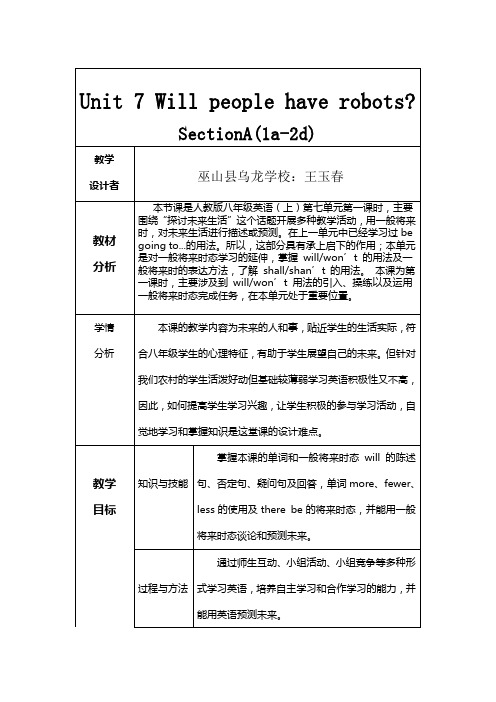

人教版英语八年级上册Unit 7 Will people have robots?教材全解【教材内容解析】Section A1.Do you think there will be robots in people’s homes? (P. 49)本句是主从复合句,从句为宾语从句,如果do you think放在句中,则为插入语,放在特殊疑问词后面,结构为:疑问词+do you think+主语+谓语+其它。
Which do you think is the best movie theatre?2.People will l ive to be 200 years old. (P. 49)live to be+基数词+years old意为“活到……岁”。
In the story, people will live to be 500 years old.3.Will people use money in 100 years? (P. 49)“in+一段时间”表示“在……之后”或“在……之内”,通常用于一般将来时,常用来回答how soon的提问;“for+一段时间”则表示持续多长时间,用来回答how long的提问。
The film will begin in two minutes.They have lived here for three years.4.What’s your prediction about the future?(P. 50)future作名词,表示“将来、未来”,in the future表示“在将来”。
Who knows what will happen in the future.5.I don’t think so.(P. 50)I don’t think so表示“我不这么认为”,肯定形式为I think so。
---Look at the cloud. It is going to rain.---I don’t think so. It will be sunny soon.【拓展】类似的结构还有:I hope so“我希望如此”,I hope not“我希望不是这样”,I’m afraid so“恐怕如此”,I’m afraid not“恐怕不是这样的”。
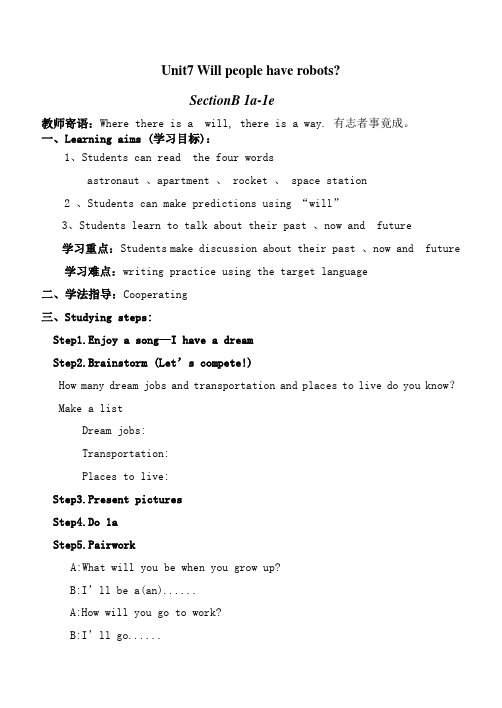
Unit7 Will people have robots?SectionB 1a-1e教师寄语:Where there is a will, there is a way. 有志者事竟成。
一、Learning aims (学习目标):1、Students can read the four wordsastronaut 、apartment 、 rocket 、 space station2 、Students can make predictions using “will”3、Students learn to talk about their past 、now and future学习重点:Students make discussion about their past 、now and future 学习难点:writing practice using the target language二、学法指导:Cooperating三、Studying steps:Step1.Enjoy a song—I have a dreamStep2.Brainstorm (Let’s compete!)How many dream jobs and transportation and places to live do you know? Make a listDream jobs:Transportation:Places to live:Step3.Present picturesStep4.Do 1aStep5.PairworkA:What will you be when you grow up?B:I’ll be a(an)......A:How will you go to work?B:I’ll go......A:Where will you live?B:I’ll live......Step6.Listening practiceFirst,(1c) Listen to Alexis and Joe. Number the pictures [1-3].Next,(1d) Listen again. Fill in the blanks with the correct verbs in the box.Step7.Talk ShowNow interview(采访) everyone’s life now,five years ago and five years from now in your groups.Name Now five years ago In five yearsInterviewer(采访者):......A:......B: ......C: ......... ... ...Step8. WritingAccording to the above results. I think you can do some writing,then report like this:In my group, Zhang Wei was a...and he played soccer and he had ...five years ago.But now he is a...四、Self—check(自我检测)单项选择1.In ten years, John_______ an astronaut.A. isB. will beC. wasD. will2.Mary_______computer science last year.A. studiedB. studiesC. will study3. What_______the world be like in 50 years?A. isB. willC. wasD. are五、Blackboard Design1、key wordsAstronaut rocket apartment space station2、key pointsPlayed ---- play --- will play六、Homework想像一下20年之前的郑州、看看现在的郑州,再设想一下20年之后的郑州,然后小组讨论并写一篇80字左右的文章。

人教版英语八年级上册Unit 7 Will people have robots?教材全解及单元测试卷【教材内容解析】Section A1.Do you think there will be robots in people’s homes? (P. 49)本句是主从复合句,从句为宾语从句,如果do you think放在句中,则为插入语,放在特殊疑问词后面,结构为:疑问词+do you think+主语+谓语+其它。
Which do you think is the best movie theatre?2.People will l ive to be 200 years old. (P. 49)live to be+基数词+years old意为“活到……岁”。
In the story, people will live to be 500 years old.3.Will people use money in 100 years? (P. 49)“in+一段时间”表示“在……之后”或“在……之内”,通常用于一般将来时,常用来回答how soon的提问;“for+一段时间”则表示持续多长时间,用来回答how long的提问。
The film will begin in two minutes.They have lived here for three years.4.What’s your prediction about the future?(P. 50)future作名词,表示“将来、未来”,in the future表示“在将来”。
Who knows what will happen in the future.5.I don’t think so.(P. 50)I don’t think so表示“我不这么认为”,肯定形式为I think so。
---Look at the cloud. It is going to rain.---I don’t think so. It will be sunny soon.【拓展】类似的结构还有:I hope so“我希望如此”,I hope not“我希望不是这样”,I’m afraid so“恐怕如此”,I’m afraid not“恐怕不是这样的”。
6.So what will the future be like? (P. 50)what is...like可以用来提问外貌、情形,也可以用来提问某人性格或者品质。
---What’s Tom like?---He is funny.7.There will be fewer trees and the environment will be in great danger. (P. 50)in danger表示“处于危险中”,out of danger意为“脱离危险”。
He is in danger now.Some animals are out of danger.8.Will we have to move to other planets? (P. 50)other作形容词,意为“别的、其它的”。
There are other ways to do this exercise.【拓展】other, the other, another, others和the others辨析other: 意为“别的、其它的”,常用来修饰可数名词。
the other: 表示“两者中另一个”,是特指;the other之后也可以加复数名词,特指“其它的”。
another: 表示“三者中另一个”。
others: 用作代词,泛指“其他的人或物”是复数概念。
the others: 特指在一个整体中的“其余的人或物(全部)”。
We study Chinese, English, Math and other subjects.There are three people in the room. One is a girl and the other two are boys.You should think of others.There are fifty-five students in our class. Thirty of us are girls and the others are boys.9.Everyone should play a part in saving the earth. (P. 50)play a part in意为“参与……、在……中发挥作用”,后接名词、代词或者动名词作宾语。
Mr. Black doesn’t play a part in the discussion.Section B1.space station (P. 52)space用作不可数名词,表示“太空、空间”,意为“空间”时,相当于room,make space/room for表示“为……腾出位置”。
Will people be able to live in space in the future?There isn’t much space on the bus.2.Will robots think like humans in the future?(P. 53)human用作名词,意为“人、人类”,相当于human being,复数形式为humans。
Dogs can hear better than humans.3.Today there are already robots working in factories. (P. 53)(1)“There be+sb./sth.+doing sth.”意为“有某人/某物正在做某事”。
There are some boys standing on the playground.(2) already作副词,表示“已经”,一般用于肯定句中,用于疑问句中时,表示惊讶的语气。
They continued working, though it was already midnight.4.Some can help to build cars, and they do simple jobs over and over again. (P. 53)over and over again意为“反复地、一次又一次地”。
He thanked me over and over again.5.For example, scientists James White thinks that robots will never be able to wake up and know where they are.(P. 53)wake up表示“醒来、喊醒”。
Every day I wake up at six o’clock.Please wake up your younger sister.6.But many scientists disagree with Mr. White. (P. 53)disagree为不及物动词,反义词是agree,disagree with sb.意为“不同意某人”。
I disagree with you about this.7.However, they agree it may take hundreds of years.(P. 53)(1) agree作动词,意为“同意、赞同”,名词形式为agreement,反义词是disagree,agree to do sth.意为“同意做某事”。
She agreed to buy this book.【拓展】agree的其它用法1. agree with sb.意为“同意某人的看法或者想法”。
I am afraid I can’t agree with you.2. agree to sth. 同意(计划、安排、建议)Do you think he’ll agree to our proposal?3. agree on 约定、商定Can we agree on a date?(2)hundred of表示“许多、大量”,hundred, thousand, million, billion前面有具体数字修饰,表示确切意义时,用单数形式;后接of,表示约数时,用复数形式。
three thousand millions of visitors8.These new robots will have many different shapes. (P. 53)shape用作名词,表示“形状、外形”,in the shape of“呈现……形状”,out of shape“变形的、走样的”。
The pool was in the shape of a heart.I’m a bit out of shape and I want to lose weight.9. If buildings fall down with people inside, these snake robots can help look for people under the buildings. (P. 53)find, look for和find out辨析find意为“找到”,强调寻找的结果;look for意为“寻找”,强调寻找的过程;find out意为“查明”,多指通过调查、询问、研究之后“搞清楚、弄明白”之意,通常含有通过困难曲折之意,多指找出较难找到的、无形的、抽象的东西。
I looked for it everywhere, but I could not find it.Please find out when the train leaves.10. This was not possible20 years ago, but computers and rockets also seemed impossible 100 years ago. (P. 53)possible作形容词,表示“可能的”,反义词为impossible,表示“不可能的”。
Everything is possible as long as we work hard.Don’t ask me to do impossible things.11.Which side do you agree with? (P. 54)side此处用作名词,表示“一方”。